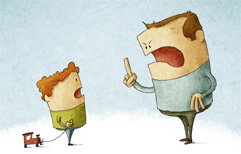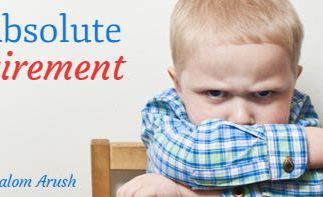
No Room for Anger
A child cannot understand how his mischief provokes such disproportionate reactions. The truth is that the parent's own internal pressures cause the outbursts...

Child education must be devoid of anger. The minute that an educator gets angry with his pupil, he loses the power to educate. Losing his self-control results in losing control over the child; our Sages said that an impatient person cannot educate. A person who suffers from anger cannot teach, because his students will not be able to learn from him.
A teacher or parent who has to deal with a child’s misbehavior, lack of discipline or any other problem must know that if he becomes angry, he will be accomplishing the opposite of what he is trying to achieve. He wants to attain control and authority, but with anger, he loses it. When a child sees his parent losing control, he loses his respect for the parent. The anger highlights the parent’s character weakness. A child cannot admire a parent who lacks self-control and serenity. An effective educator must therefore be a person with a noble character.
The Zohar says that a person who becomes angry loses his Divine soul. Instead, a dark side force enters him. This is the deeper meaning of the teaching that when a person becomes angry, his Divine image  diminishes and he morphs into an animal. No wonder that he cannot educate his own children.
diminishes and he morphs into an animal. No wonder that he cannot educate his own children.
Suppose someone told you about a rabbi who could teach you wisdom and understanding. You visit that rabbi, only to discover that he becomes angry over the smallest foolishness as if he were no better than a crass fishmonger in an outdoor market. You certainly would not want to learn anything from that rabbi. In your heart, you would scorn him.
This is exactly what happens to a child when his parent or teacher becomes angry. The child scorns such a parent or teacher, particularly when the parent shows his weakness with his uncontrollable anger. Some angry parents and teachers irresponsibly blame the children for their own faults, attempting to make the child feel guilty. Such “martyr-type” parents might say, “Look what you have done to me, you’re causing me such grief! Don’t you have any mercy on me?” Even worse, some such parents attach labels to their children, like, “Look what you have done, you wicked child!”
Such behavior is irresponsible, devastating and pitiful, highlighting parental weakness. Especially if the parent becomes violent, the child thinks, “What’s wrong with this father? He’s not normal! Why is he so violent? What did I do?” The child cannot understand how his mischief or misdeed provoked such a disproportionate and irrational reaction. The truth is that the parent’s own internal pressure caused the outburst. The child might fear such a parent, but he won’t have any respect, love or regard for the parent.
Parents and teachers must resolve to rid themselves of anger, especially in their relations with their children, for two reasons:
First, the Torah forbids anger, no matter what. There is no situation in which the Torah allows a person to be angry, not even in order to educate his children. It is forbidden to transgress the Torah, no matter what the child has done, for it is forbidden to act against Hashem’s will. Can a person who transgresses and becomes angry gain anything? It’s not very likely.
Second, a parent must have the proper self-composure to make the many day-to-day decisions in educating his children. Anger destroys self-composure and the ability to make the right decisions. The conclusion is never to get angry – no matter what.
The angry parent demonstrates that his personal service of G-d and self-rectification are sorely lacking. A person who strives to improve his character understands that he himself stumbles occasionally – sometimes due to stupidity or carelessness, sometimes because he wasn’t paying attention or because he simply gave in to his Evil Inclination. So why can’t he understand that his child also makes mistakes? Is that fair? The hypocritical parent doesn’t castigate himself with cruelty, but reacts with wrath any time his child does something wrong. What an ugly double standard.
A true servant of Hashem rejoices in his own good points, as well as in the good points of others. Sure, he knows he has faults like everyone else, but – despite his shortcomings – he simply does his best to amend his misdeeds, asking Hashem to draw him closer. He relates to his child in the same patient, tolerant and understanding way. He understands that the child too has an Evil Inclination and also makes mistakes. This type of parent is understanding and forgiving, and does his best to guide his child with patience. Patience is a dear commodity we should all pray for.
An educator’s inconsistency and double standards are absurd and unfair. For instance, suppose that the child breaks a cup; it’s common for parents to rebuke the child for not being careful and not listening to their warnings. But when the parent breaks a cup, he doesn’t torment himself at all.
A teacher who is not constantly striving toward self-improvement doesn’t usually fulfill the adage of our Sages – to not judge someone until you are in his place. He doesn’t understand the child’s place at all. He gets angry at the child as if the child was supposed to be an angel, devoid of any Evil Inclination, already equipped with inner peace, serenity and a mature decision-making process. He makes demands of the child that he himself can’t fulfill; again, the classic double standard of the hypocritical parent who doesn’t work on himself. He is sure that his child just wants to spite him. Such a parent shows from callousness an acute lack of wisdom. Obviously, a person like that cannot educate. He can’t educate himself, so how could he possibly educate others?
We can’t overemphasize the value of constant efforts toward self-improvement. The parent who is not actively working striving to uproot anger and cruelty from the very fiber of his soul cannot educate his child. Life with anger-prone people is purgatory. Once we rid ourselves of the anger, everyone benefits, especially our children.










Tell us what you think!
Thank you for your comment!
It will be published after approval by the Editor.